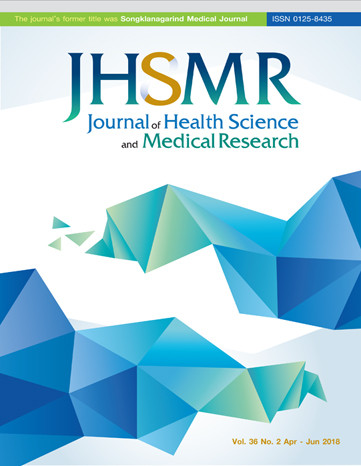Down-Regulation of 14-3-3σ Reduces Proliferation of Human Lung Cancers But Not Colon Cancer Cells
DOI:
https://doi.org/10.31584/jhsmr.2018.36.2.3Keywords:
14-3-3σ, cancer, cell proliferation, siRNAAbstract
Objective: 14-3-3σ protein is well known for its tumor suppressive function in breast cancer. However, recent evidence has raised the possibility that the 14-3-3σ protein may also have an oncogenic function in certain cancer types. The aim of this study was to investigate the oncogenic function of 14-3-3σ in adenocarcinoma cell lines of the lung (A549, H358) and colon (HT-29).
Material and Methods: siRNA against 14-3-3σ was used to suppress 14-3-3σ expression. Cell proliferation, cell-cycle distribution and expression of related molecules were determined by MTT, flow cytometry, and western blotting, respectively.
Results: Down-regulation of 14-3-3σ significantly reduced the proliferation of A549 and H358 by 35.0% and 31.0%, respectively, and significantly induced cell cycle arrest at the G0/G1 and G2/M phases, respectively. Increased p21 expression by 43.0% was only observed in si-14-3-3σ-H358 cells. The si-14-3-3σ-HT-29 cells showed no alteration of cell proliferation and cell-cycle distribution but harbored reduced p53 expression by 56.0% and p27 expression by 67.0%.
Conclusion: 14-3-3σ may have an oncogenic function in lung adenocarcinoma but play a different role in colon cancer.
References
2. van Hemert MJ, Steensma HY, van Heusden GP. 14-3-3 proteins: key regulators of cell division, signalling and apoptosis. Bioessays 2001;23:936-46.
3. Fu H, Subramanian RR, Masters SC. 14-3-3 proteins: structure, function, and regulation. Annu Rev Pharmacol Toxicol 2000;40:617-47.
4. Aitken A. 14-3-3 proteins: a historic overview. Semin Cancer Biol 2006;16:162-72.
5. Lodygin D, Hermeking H. The role of epigenetic inactiva-tion of 14-3-3 sigma in human cancer. Cell Res 2005;15:237-46.
6. Ferguson AT, Evron E, Umbricht CB, Pandita TK, Chan TA, Hermeking H, et al. High frequency of hypermethylation at the 14-3-3 sigma locus leads to gene silencing in breast cancer. Proc Natl Acad Sci U S A 2000;97:6049-54.
7. Mhawech P, Benz A, Cerato C, Greloz V, Assaly M, Desmond JC, et al. Downregulation of 14-3-3 sigma in ovary, prostate and endometrial carcinomas is associated with CpG island methylation. Mod Pathol 2005;18:340-8.
8. Perathoner A, Pirkebner D, Brandacher G, Spizzo G, Stadlmann S, Obrist P, et al. 14-3-3 sigma expression is an independent prognostic parameter for poor survival in colorectal carcinoma patients. Clin Cancer Res 2005;11:3274-9.
9. Osada H, Tatematsu Y, Yatabe Y, Nakagawa T, Konishi H, Harano T, et al. Frequent and histological type-specific
inactivation of 14-3-3 sigma in human lung cancers. Oncogene 2002;21:2418-24.
10. Li Z, Dong Z, Myer D, Yip-Schneider M, Liu J, Cui P, et al. Role of 14-3-3 sigma in poor prognosis and in radiation and drug resistance of human pancreatic cancers. BMC Cancer 2010;10:598.
11. Yang HY, Wen YY, Chen CH, Lozano G, Lee MH. 14-3-3 sigma positively regulates p53 and suppresses tumor growth. Mol Cell Biol 2003;23:7096-107.
12. Hermeking H, Lengauer C, Polyak K, He TC, Zhang L, Thiagalingam S, et al. 14-3-3 sigma is a p53-regulated
inhibitor of G2/M progression. Mol Cell 1997;1:3-11.
13. Laronga C, Yang HY, Neal C, Lee MH. Association of the cyclin-dependent kinases and 14-3-3 sigma negatively
regulates cell cycle progression. J Biol Chem 2000;275:23106-12.
14. Shiba-Ishii A, Kim Y, Shiozawa T, Iyama S, Satomi K, Kano J, et al. Stratifin accelerates progression of lung adenocarcinoma at an early stage. Mol Cancer 2015;14:142.
15. Ide M, Saito K, Tsutsumi S, Tsuboi K, Yamaguchi S, Asao T, et al. Over-expression of 14-3-3 sigma in budding
colorectal cancer cells modulates cell migration in the presence of tenascin-C. Oncol Rep 2007;18:1451-6.
16. Boudreau A, Tanner K, Wang D, Geyer FC, Reis-Filho JS, Bissell MJ. 14-3-3 sigma stabilizes a complex of soluble
actin and intermediate filament to enable breast tumor invasion. Proc Natl Acad Sci U S A 2013; 110: E3937-44.
17. Kuroda Y, Aishima S, Taketomi A, Nishihara Y, Iguchi T, Taguchi K, et al. 14-3-3 sigma negatively regulates the cell
cycle, and its down-regulation is associated with poor outcome in intrahepatic cholangiocarcinoma. Hum Pathol 2007;38:1014-22.
18. Yoon NK, Seligson DB, Chia D, Elshimali Y, Sulur G, Li A, et al. Higher expression levels of 14-3-3 sigma in ductal carcinoma in situ of the breast predict poorer outcome. Cancer Biomark 2009;5:215-24.
19. Suzuki F, Nagase S, Suzuki K, Oba E, Hiroki E, Matsuda Y, et al. Decreased expression of 14-3-3 sigma is predictive
of poor prognosis for patients with human uterine papillary serous carcinoma. Tohoku J Exp Med 2013;231:193-9.
20. Li YL, Liu L, Xiao Y, Zeng T, Zeng C. 14-3-3 sigma is an independent prognostic biomarker for gastric cancer and is associated with apoptosis and proliferation in gastric cancer. Oncol Lett 2015;9:290-4.
21. Qi W, Liu X, Qiao D, Martinez JD. Isoform-specific expression of 14-3-3 proteins in human lung cancer tissues. Int J
Cancer 2005;113:359-63.
22. Shiba-Ishii A, Kano J, Morishita Y, Sato Y, Minami Y, Noguchi M. High expression of stratifin is a universal abnormality during the course of malignant progression of early-stage lung adenocarcinoma. Int J Cancer 2011;129:2445-53.
23. Dhar S, Squire JA, Hande MP, Wellinger RJ, Pandita TK. Inactivation of 14-3-3 sigma influences telomere behavior
and ionizing radiation-induced chromosomal instability. Mol Cell Biol 2000;20:7764-72.
24. Chan TA, Hermeking H, Lengauer C, Kinzler KW, Vogelstein B. 14-3-3 sigma is required to prevent mitotic catastrophe after DNA damage. Nature 1999;401:616-20.
25. Tsvetkov P, Reuven N, Shaul Y. Ubiquitin-independent p53 proteasomal degradation. Cell Death Differ 2010;17:103-8.
26. Nagata Y, Anan T, Yoshida T, Mizukami T, Taya Y, Fujiwara T, et al. The stabilization mechanism of mutant-type p53 by impaired ubiquitination: the loss of wild-type p53 function and the hsp90 association. Oncogene 1999;18:6037-49.
27. Chang TC, Liu CC, Hsing EW, Liang SM, Chi YH, Sung LY, et al. 14-3-3σ regulates β-catenin-mediated mouse embryonic stem cell proliferation by sequestering GSK-3β. PLoS One 2012;7:e40193.
28. Casalini P, Iorio MV, Berno V, Bergamaschi A, Borresen Dale AL, Gasparini P, et al. Relationship between p53 and p27 expression following HER2 signaling. Breast 2007;16:597-605.
29. Besson A, West MG, Schmidt A, Hall A, Roberts JM. p27Kip1 modulates cell migration through the regulation of RhoA activation. Genes Dev 2004;18:862-76
























